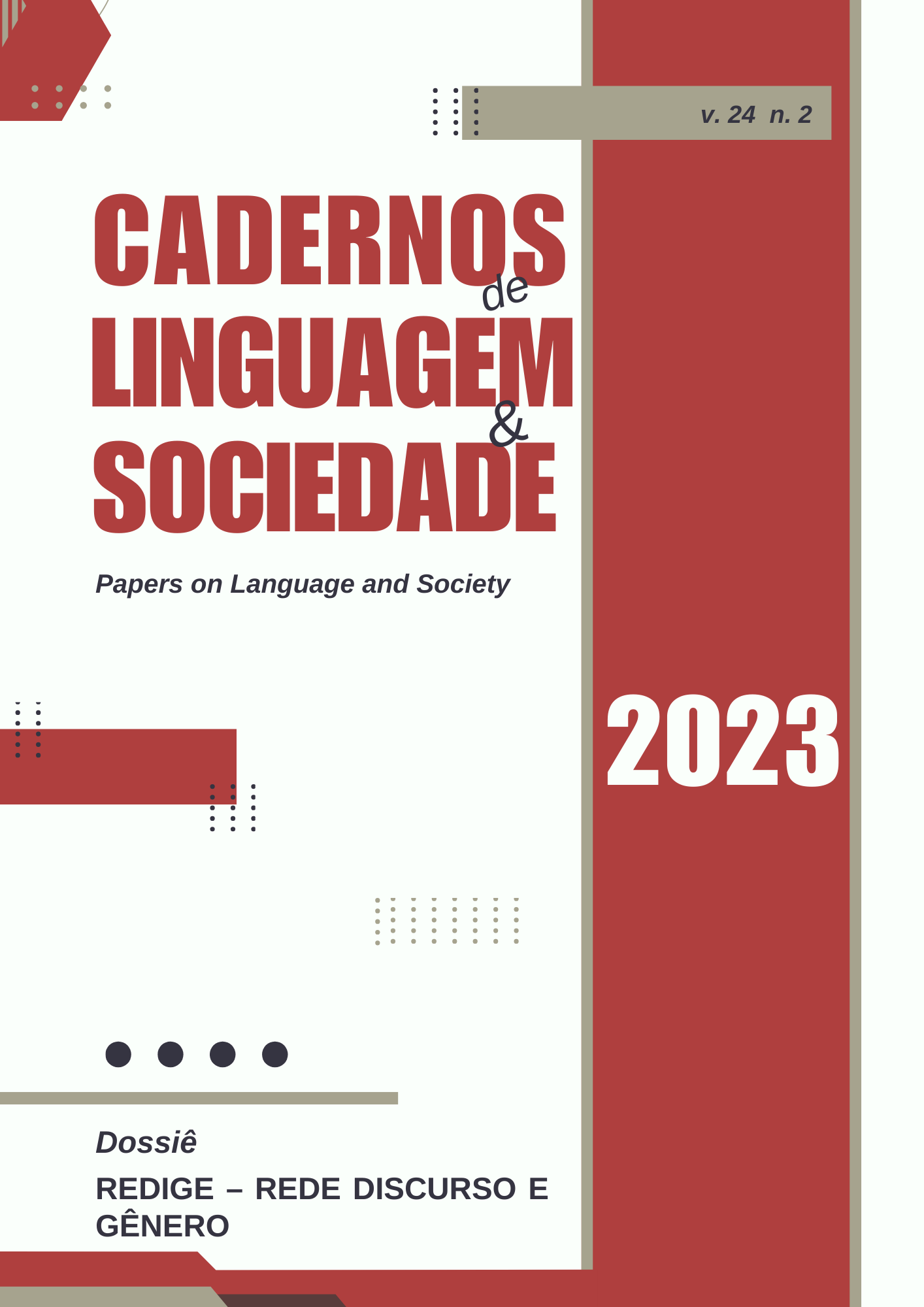UNA CARACTERIZACIÓN DEL DISCURSO ANTI-GÉNERO/SEXUALIDAD Y SUS ESTRATEGIAS DESDE EL ANÁLISIS CRÍTICO DEL DISCURSO
DOI:
https://doi.org/10.26512/les.v24i2.51256Palavras-chave:
DISCURSO ANTI-GÉNERO, SEXUALIDAD, ESTRATEGIAS DISCURSIVAS, ANÁLISIS CRÍTICO DEL DISCURSOResumo
Este artigo oferece uma reflexão crítica sobre um aspecto do “armamento simbólico” das atuais lutas contra o gênero e a diversidade sexual: as estratégias discursivas. Para tal, é apresentada uma definição operacional de “discurso anti-género/sexualidade” que mostra o complexo quadro social, político, económico e cultural que suporta a produção e circulação deste discurso. Em seguida, são identificadas as estratégias mais recorrentes do discurso antigênero/sexualidade e seus potenciais efeitos retóricos – com base em pesquisas próprias e de outros autores regionais. Isso nos permite vislumbrar possíveis linhas de pesquisa e desafios futuros nos estudos críticos do discurso com foco em gênero e sexualidade.
Downloads
Referências
ABRACINSKAS, L.; PUYOL, S.; IGLESIAS, N.; KREHER, S. Políticas Antigénero en Latinoamérica. Uruguay, el mal ejemplo. Montevideo: MYSU, 2019.
APPLE, M.; OLIVER, A. Becoming Right: Education and the formation of conservative movements. In APPLE, M. (org.) The State and the Politics of Knowledge. Nueva York / Londres: Routledge, 2003.
BAJTÍN, M.M. Estética de la creación verbal. Madrid: Siglo XXI, 1998.
BORBA, R. Enregistering “gender ideology”: The emergence and circulation of a transnational anti-gender language. Journal of Language and Sexuality, v. 11, n. 1, 2022.
BORBA, R. Introduçao. Linguística queer: algumas desorientaçoes. In BORBA, R. (org.). Discursos Transviados. Por uma Linguística Queer. São Paulo: Cortez, 2020.
BRACKE, S.; PATTERNOTE, D. Desentrañando el pecado del género. In Habemus Género! La Iglesia Católica y Ideología de Género. Textos Seleccionados. G&PAL, 2018.
BUTLER, J. What threat? The campaign against “gender ideology”. Glocalism: Journal of Culture, Politics and Innovation, v. 3 n. 1, 2019.
CALDAS-COULTHARD, C.R. Sexismo cotidiano banal e persistente na politica brasileira. Ilha do Desterro, v. 75 n. 3, 2022.
CALDAS-COULTHARD, C. R. Preface. In CALDAS-COULTHARD, C.R. (org.) Innovation and Challenges: Women, Language and Sexism. Londres: Routledge, 2020.
CALDAS-COULTHARD, C. R. On reporting reporting: the representation of speech in factual and factional narratives. In COULTHARD, N. (org.). Advances in Written Text Analysis. Londres: Routledge, 1994.
CANALE, G. CDA as local praxis: Educational media and anti-gender/sexuality discourse in news reports in Uruguay. In CALDAS-COULTHARD, C.R. y COULTHARD, M. (orgs.). Texts and Practices Revisited. Londres / Nueva York: Routledge, 2023a.
CANALE, G. A Multimodal and Ethnographic Approach to Textbook Discourse. Londres / Nueva York: Routledge, 2023b.
CORRÊA, S. (ed). Anti-Gender Politics in Latin America. Country Case Studies Summaries. Rio de Janeiro: G&PAL, 2020.
FAIRCLOUGH, N. Semiosis, ideology and mediation: A dialectical view. In LASSEN, I.; STRUNCK, J. & VESTARGAARD, T. (orgs.), Mediating ideology in text and image. Ten critical studies (pp. 19–36). Amsterdam / Filadelfia: John Benjamins, 2006.
FAIRCLOUGH, N. Analysing Discourse: Textual analysis for social research. Nueva York / Londres: Routledge, 2003.
FAIRCLOUGH, N. Media Discourse. Londres: Hodder, 1995.
FAIRCLOUGH, N. Language and Power. Nueva York: Longman, 1989.
FAIRCLOUGH, I.; FAIRCLOUGH, N. Political Discourse Analysis. Routledge: Nueva York, 2012.
FREIRE, P. El grito manso. Buenos Aires: Siglo XXI, 2003.
FURTADO, V. Mujeres transformando el silencio en lenguaje y acción. Las prácticas discursivas del feminismo en el Uruguay contemporáneo. Tesis de la Maestría en Ciencias Humans, opción Lenguaje, Cultura y Sociedad. Facultad de Humanidades y Ciencias de la Educación, Universidad de la República. https://www.colibri.udelar.edu.uy/jspui/handle/20.500.12008/37040, 2022.
GRAFF, A.; KOROLCZUK, E. Anti-Gender Politics in the Populist Moment. Londres / Nueva York: Routledge, 2022.
KOVÁTS, E.; PÕIM, M. eds. Gender as Symbolic Glue: The Position and Role of Conservative and Far Right Parties in the Anti-Gender Mobilization in Europe. Brussels: Fondation for European Progressive Studies and Friedrich-Ebert-Stiftung Budapest, 2015.
KRESS, G. Semiotic work. Applied linguistics and a social semiotic account of multimodality. AILA Review, v.28 n.1, 2015.
LACLAU, E.; MOUFFE, C. Hegemony and Socialist Strategy: Towards a Radical Democratic Politics. Londres: Verso, 1985.
MACGILCHRIST, F. Fissures in the discourse-scape: Critique, rationality and validity in post-foundational approaches to CDS. Discourse & Society, v. 27, n. 3, 2016.
MARTINIS, P.; RODRÍGUEZ BISSIO, G. Ofensiva conservadora y educación en Uruguay. Temas em Educaçao, v. 29, n. 3, 2021.
MEYER, M. Between Theory, Method and Politics: positioning of the approaches to CDA. In WODAK, R. & MEYER, M. (orgs.) Methods of Critical Discourse Analysis. Londres: Sage, 2001.
MUDDE, CAS. Populist Radical Right Parties in Europe. Cambridge: Cambridge University Press, 2007.
PATTERNOTE, D.; KUHAR, R. “Gender Ideology” in Movement: Introduction. In KUHAR, R. & PATTERNOTE, D. (orgs.) Anti-Gender Campaigns in Europe. Mobilizing against Equality. Londres / Nueva York: Rowman y Littlefield, 2017.
PELINKA, ANTON. “Right-Wing Populism: Concept and Typology.” In WODAK, R.; KHOSRAVI-NIK, M. & MRAL, B. (orgs.) Right-Wing Populism in Europe. Londres: Bloomsbury, 2013.
TORRES, G.S.M.; PÉREZ, S. I.; MORAGAS, F. “Gender Ideology” in Conservative Discourses: Public Sphere and Sex Education in Argentina. In PÉREZ, M. & TRUJILLO-BARBADILLO, G. (orgs.) Queer Epistemologies in Education. Luso-Hispanic Dialogues and Shared Horizons. Cham: Palgrave Macmillan, 2020.
PÉREZ, S.; TORRES, G. Discurso religioso: “Ideología de género” y grupos anti-género en América Latina. Comunicación para la Igualdad, 2020.
PÉREZ NAVARRO, P. Retórica antigȇnero e orden pública: a cruzada das crianças. Cadernos de Linguagem e Sociedade, v. 21, n. 2, 2020.
SCOTT, J.W. Sex and Secularism. Princeton y Oxford: Princeton University Press, 2018.
TEBALDI, C Tradwives and true warriors: Gender and nationalism in US white nationalist women’s blogs. Gender and Language, v. 17, n. 1, 2023.
VAN DIJK, T.A. Opiniones e ideología en la prensa. Voces y Culturas, v. 10, n. 2, 1996.
VAN DIJK, T.A. Discurso, conocimiento e ideología: Reformulación de viejas cuestiones y propuestas de algunas soluciones nuevas. Cuadernos de Información y Comunicación, v. 10, n. 1, 2005.
VAN LEEUWEN, T.; WODAK, R. Legitimizing immigration control: a discourse-historical analysis. Discourse Studies, v. 1, n. 1, 1999.
VIEIRA, V.C. Perspectivas decoloniais feministas do discurso na pesquisa sobre educaçao e gȇnero-sexualidade. In DE MELO RESENDE, V. (org.). Decolonizar os estudos críticos do discurso. Campinas, Pontes, 2019.
WHITE, P.R.R. Telling Media Tales: the news story as rhetoric. Tesis Doctoral. University of Sydney. https://www.prrwhite.info/prrwhite,%201998,%20Telling%20Media%20Tales%20(unpublished%20PhD).pdf , 1998.
WODAK, R. The discourse-historical approach. In WODAK, R & MEYER, M. (eds.), Methods of Critical Discourse Analysis. Londres: Sage, 2001.
WODAK, R. The Politics of Fear. What Right-Wing Populist Discourses Mean. Londres: Sage, 2015.
YU, Y.; HONGSHENG, S. The anxiety over soft masculinity: a critical discourse analysis of the “prevention of feminization of male teenagers” debate in the Chinese-language news media. Feminist Media Studies, v. 23, n. 5, 2023.
Downloads
Publicado
Como Citar
Edição
Seção
Licença
Copyright (c) 2023 Cadernos de Linguagem e Sociedade do Programa de Pós-Graduação em Linguística da UnB é licenciado sob uma Licença Creative Commons Atribuição-Uso não-comercial-Vedada a criação de obras derivadas 3.0 Unported.

Este trabalho está licenciado sob uma licença Creative Commons Attribution 4.0 International License.
Autores/as que publicam nesta revista concordam com os seguintes termos:
Autores/as mantêm os direitos autorais e concedem à revista o direito de primeira publicação, sendo o trabalho simultaneamente licenciado sob a Creative Commons Attribution 4.0 International license que permite o compartilhamento do trabalho com reconhecimento da autoria do trabalho e publicação inicial nesta revista.



